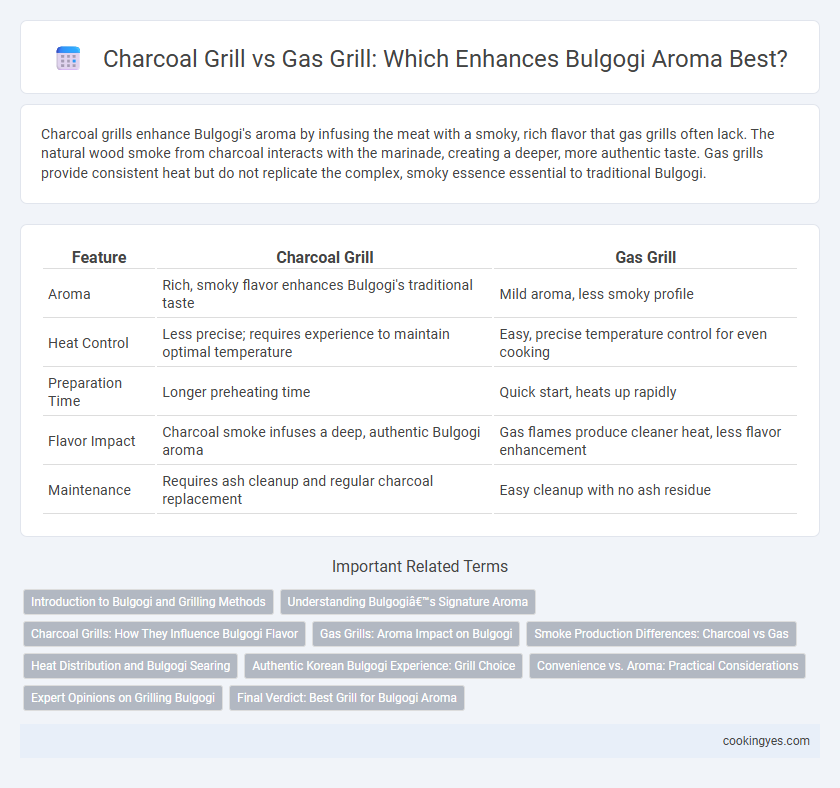Charcoal grills enhance Bulgogi's aroma by infusing the meat with a smoky, rich flavor that gas grills often lack. The natural wood smoke from charcoal interacts with the marinade, creating a deeper, more authentic taste. Gas grills provide consistent heat but do not replicate the complex, smoky essence essential to traditional Bulgogi.
Table of Comparison
| Feature | Charcoal Grill | Gas Grill |
|---|---|---|
| Aroma | Rich, smoky flavor enhances Bulgogi's traditional taste | Mild aroma, less smoky profile |
| Heat Control | Less precise; requires experience to maintain optimal temperature | Easy, precise temperature control for even cooking |
| Preparation Time | Longer preheating time | Quick start, heats up rapidly |
| Flavor Impact | Charcoal smoke infuses a deep, authentic Bulgogi aroma | Gas flames produce cleaner heat, less flavor enhancement |
| Maintenance | Requires ash cleanup and regular charcoal replacement | Easy cleanup with no ash residue |
Introduction to Bulgogi and Grilling Methods
Bulgogi, a traditional Korean marinated beef dish, achieves its signature smoky aroma through grilling techniques that influence flavor intensity. Charcoal grills imbue Bulgogi with a distinct smoky essence and a subtle char, enhancing the dish's natural sweetness and umami profile. Gas grills offer consistent heat and ease of use but lack the deep aromatic complexity integral to authentic Bulgogi experiences.
Understanding Bulgogi’s Signature Aroma
Bulgogi's signature aroma is deeply influenced by the choice of grill, with charcoal grills enhancing the meat's smoky, intense fragrance through slow, high-heat combustion that caramelizes the marinade's sugars. Gas grills, while offering convenience and consistent heat, produce a cleaner scent that may lack the depth and subtle smokiness integral to traditional Bulgogi. The charcoal's ability to infuse mesquite-like notes and slight char is essential for achieving the characteristic savory sweetness and complex bouquet that define authentic Bulgogi aroma.
Charcoal Grills: How They Influence Bulgogi Flavor
Charcoal grills impart a distinctive smoky aroma that enhances the rich, sweet, and savory flavors of Bulgogi, complementing the marinated beef's caramelization. The high, uneven heat from charcoal creates subtle charring and a depth of flavor unattainable with gas grills, infusing each bite with authentic Korean BBQ essence. Charcoal's natural combustion releases aromatic compounds that penetrate the meat, intensifying Bulgogi's umami and providing an irresistible, mouthwatering experience.
Gas Grills: Aroma Impact on Bulgogi
Gas grills provide consistent heat that enhances the caramelization of Bulgogi's marinated beef, preserving its sweet and savory aroma. The controlled flame of a gas grill minimizes smoke, allowing the marinade's complex spices and garlic to remain distinct without overpowering the beef's natural fragrance. This results in Bulgogi with a cleaner, more vibrant aroma compared to the smoky scent imparted by charcoal grilling.
Smoke Production Differences: Charcoal vs Gas
Charcoal grills produce dense, flavorful smoke from burning wood and charcoal, infusing Bulgogi with a rich, authentic aroma that enhances its savory and slightly sweet marinade. Gas grills emit minimal smoke, resulting in a cleaner, less smoky flavor that can sometimes lack the depth characteristic of traditional Korean barbecue. The smoke production difference significantly impacts the sensory experience, with charcoal delivering the classic smoky essence cherished in Bulgogi cooking.
Heat Distribution and Bulgogi Searing
Charcoal grills provide uneven heat distribution that creates intense, localized high temperatures, ideal for achieving the authentic caramelized sear and smoky aroma characteristic of traditional bulgogi. Gas grills offer more consistent and controllable heat, allowing precise searing without flare-ups but lack the complex smoky fragrance imparted by charcoal combustion. Optimal bulgogi searing benefits from charcoal's radiant heat and aromatic smoke, enhancing flavor depth and texture compared to the cleaner taste from gas grilling.
Authentic Korean Bulgogi Experience: Grill Choice
Charcoal grills impart a smoky, rich aroma essential for an authentic Korean Bulgogi experience, enhancing the meat's natural sweetness and marinated flavors. Gas grills offer precise temperature control and convenience but lack the depth of flavor and traditional smokiness that charcoal provides. For true Bulgogi enthusiasts seeking genuine taste, charcoal grilling remains the preferred method to capture the dish's original essence.
Convenience vs. Aroma: Practical Considerations
Charcoal grills enhance Bulgogi's smoky aroma and rich flavor due to higher heat and natural wood combustion, creating an authentic Korean barbecue experience. Gas grills offer convenience with easy temperature control and quicker start-up, ideal for busy cooks but may lack the intense, smoky aroma produced by charcoal. Choosing between charcoal and gas grill depends on prioritizing aromatic depth versus cooking convenience for Bulgogi preparation.
Expert Opinions on Grilling Bulgogi
Experts emphasize that charcoal grills enhance Bulgogi's smoky aroma by infusing the meat with natural wood and charcoal flavors, which gas grills often lack. The high, consistent heat from charcoal ensures a caramelized, tender texture that experts associate with authentic Korean barbecue. While gas grills offer convenience and control, grilling Bulgogi over charcoal remains the preferred method among chefs for its superior aroma and traditional taste.
Final Verdict: Best Grill for Bulgogi Aroma
Charcoal grills produce a smokier, more authentic flavor that enhances Bulgogi's signature sweet and savory aroma through the infusion of wood smoke. Gas grills offer precise temperature control and convenience but lack the deep, smoky aroma that charcoal imparts. For the richest and most traditional Bulgogi aroma, a charcoal grill remains the best choice.
Charcoal grill vs Gas grill for Bulgogi aroma Infographic

 cookingyes.com
cookingyes.com